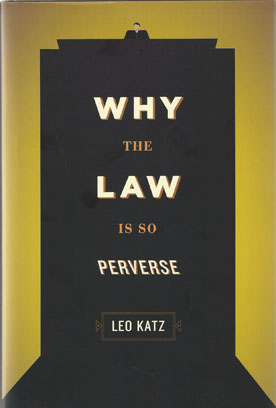
Conundrums, puzzles, and perversities: these are Leo Katz's stock-in-trade, and in Why the Law Is So Perverse, he focuses on four fundamental features of our legal system, all of which seem to not make sense on some level and to demand explanation.
First, legal decisions are essentially made in an either/or fashion - guilty or not guilty, liable or not liable, either it's a contract or it's not - but reality is rarely that clear-cut. Why aren't there any in-between verdicts?
Second, the law is full of loopholes. No one seems to like them, but somehow they cannot be made to disappear. Why? Third, legal systems are loath to punish certain kinds of highly immoral conduct while prosecuting other far less pernicious behaviors. What makes a villainy a felony?
Finally, why does the law often prohibit what are sometimes called win-win transactions, such as organ sales or surrogacy contracts? Katz asserts that these perversions arise out of a cluster of logical difficulties related to multicriterial decision making.
The discovery of these difficulties dates back to Condorcet's eighteenth-century exploration of voting rules, which marked the beginning of what we know today as social choice theory. Condorcet's voting cycles, Arrow's Theorem, Sen's Libertarian Paradox - every seeming perversity of the law turns out to be the counterpart of one of the many voting paradoxes that lie at the heart of social choice.
Katz's lucid explanations and apt examples show why they resist any easy resolutions. "The New York Times Book Review" called Katz's first book "a fascinating romp through the philosophical side of the law". Why the Law Is So Perverse is sure to provide its readers a similar experience.